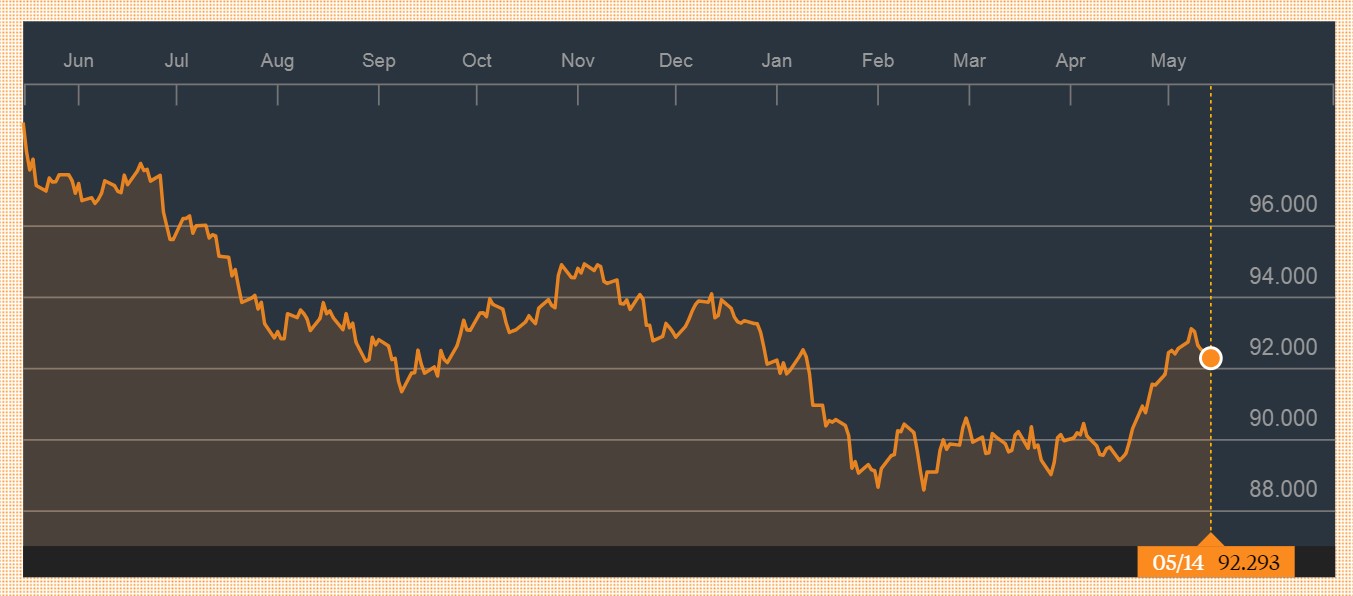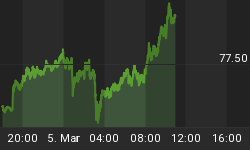Monday, May 14, 2018
Markets briefly rally, but trim gains on Mideast tension. The U.S. and China ratcheted down tough trade talk over the weekend, with Trump seemingly offering a more conciliatory tone. That led to a brief rally when markets opened on Monday. However, the killing of at least 50 Palestinians in Gaza by Israel – occurring alongside the opening of the U.S. embassy in Jerusalem – once again raised fears of a broader conflict in the Middle East, which pushed crude oil up and dragged down stocks. “The focus just continues to be the situation in Iran and the Middle East,” John Kilduff, partner at Again Capital LLC, told Bloomberg. “Sometimes, the temperature is high over the Middle East and sometimes it’s lower. Right now, it’s as high as it’s been in a while.”
Chart of the Week

(Click to enlarge)
- The U.S. dollar index rose to its highest point in 2018 last week at over $93, but dipped in the last few trading days.
- The run up in the dollar is the result of several factors, including rising interest rates, economic growth and capital flight from emerging markets.
- The simultaneous rally in oil prices over the past month, occurring alongside gains in the greenback, was atypical. History suggests that both crude oil and the dollar will struggle to continue to post gains; at least one of them will likely see the rally come to a halt.
Markets
Potential U.S.-China trade breakthrough lifts markets. U.S. President Donald Trump promised to rescue ailing Chinese companies affected by U.S. sanctions in a tweet over the weekend. While light on details, the comment suggested a radical shift in tone from the White House. With tens of billions of dollars in potential trade tariffs on the line, and a Chinese trade delegation traveling to Washington this week, the markets welcomed the dialed-down rhetoric.
Gap between U.S. and German bonds grows to largest in nearly 30 years. Yields on the U.S. 10-year Treasury note closed at 2.917 percent on Friday, while the German equivalent closed at 0.559 percent. The gap of 2.445 percentage points was the highest since 1989. The divergence, analysts say, has to do with both higher growth expectations in the U.S., and rate tightening from the Fed. “That spread is probably anticipating the U.S. economy is going to grow stronger than the rest of the world, and Germany in particular,” Jack McIntyre, who manages global bond portfolios at Brandywine Global Investment Management, told the Wall Street Journal. Meanwhile, U.S. debt is soaring while Germany is running surpluses. Related: Five Deals To Watch This Week
Italian stocks move up despite anticipation of an ‘outsider’ government. The anticipated formation of an Italian government led by an anti-establishment party and a far-right party has failed to rattle financial markets, as was previously expected. Italy’s high debt burden and persistent low growth levels led to spikes in Italian bond yields during the euro crisis several years ago, but the benign response to Italy more recently from financial markets signals an end to fears that the Eurozone will break up. Even the election of a purported anti-EU party has not led to financial volatility. “The risk of the eurozone breaking up is no longer in the market,” said Isabelle Vic Philippe, head of euro rates and inflation at Amundi, according to the WSJ.
Commodities
Silver prices could soar on safehaven demand. Rising geopolitical risk could be a boon for silver and other safehaven commodities. “The enormous range of economic, financial and political issues facing the world and individual investors seems more likely to lead to a rekindling of silver demand from investors,” CPM Group said in its Silver Yearbook 2018. Spot prices are down by 1.6 percent so far this year, but various flashpoints looming just over the horizon – Iran, U.S.-Russia tension, U.S.-China trade disputes – offer upside risk for gold and silver.
Gold prices edge up as dollar dips. Gold prices moved up to $1,320 per troy ounce today, building on gains from last week. The decline in the U.S. dollar is a large factor, and the dollar weakness cropped up last week after U.S. sanctions on Iran raised confusion and concern about the impact on Europe and, thus, the Euro. Gold fared better on the news.
Aluminum down again as fears fade. The bottlenecks in the aluminum market have waned recently, according to Commerzbank, which noted that the heightened concerns regarding U.S. sanctions on Russia’s Rusal have declined considerably. Aluminum prices were down 3 percent in the past week. Abundant aluminum supply is also expected to keep prices in check going forward.
Energy
OPEC says oil glut nearly eliminated. OPEC said the oil supply glut is just about over, with oil inventories in OECD countries falling to just 9 million barrels above the five-year average, according to OPEC’s latest report. That is sharply down from the 340-million-barrel surplus at the start of 2017. “The oil market was underpinned in April by renewed geopolitical issues, tightening product inventories and robust global demand,” OPEC said in its May Oil Market Report.
U.S. sanctions boosting China’s oil futures contract. U.S. sanctions on Iran could bolster the momentum of China’s new oil futures contract, pushing more of the oil trade into yuan-denominated contracts to evade the U.S. Treasury. The Shanghai contract has gained trading volume since it was launched in March, but daily volume doubled after the announcement of new U.S. sanctions on Iran last week. China is the biggest buyer of Iranian oil and Iran will try to sell in other currencies as the U.S. cracks down. “The sanctions... can potentially accelerate this process of establishing a 3rd (oil) benchmark,” Barry White, senior vice president for derivatives at INTL FCStone, told Reuters. Related: China And India Could Send Gold Soaring
ConocoPhillips to sell North Sea oil fields. ConocoPhillips (NYSE: COP) said it was moving to sell its North Sea oil fields and will step up its focus on U.S. shale. The sale of its North Sea assets could yield $2 billion in proceeds, although the company has not released details on what it is looking to dump. The decision marks the latest move by the oil majors to trim activity outside of core conventional assets while increasing spending on shale drilling.
Cryptocurrencies
HSBC used blockchain for trade finance transaction. HSBC claims it has performed the world's first commercially viable trade finance transaction using blockchain technology. HSBC issued a letter of credit to ING for a Cargill shipment of soybeans from Argentina to Malaysia. These transactions typically take time, but HSBC used blockchain technology, which promises enormous change to financial transactions. "The need for paper reconciliation is removed because all parties are linked on the platform and updates are instantaneous," Vivek Ramachandran, head of growth and innovation at HSBC, said in a statement. "The quick turnaround could mean unlocking liquidity for businesses."
Famed money manager trashes cryptocurrencies. Steve Eisman, a celebrity money manager of sorts, who successfully bet against subprime mortgages ahead of the housing meltdown a decade ago, said cryptocurrencies don’t offer value. “I don’t see the purpose of it,” Eisman said at a conference. “What value does cryptocurrency actually add? No one’s been able to answer that question for me.” The criticism comes shortly after similar remarks from Warren Buffet and Jamie Dimon, among other notable voices in finance. Buffet earlier said Bitcoin is “probably rat poison squared” and he said cryptocurrencies “almost certainly…will come to a bad ending.”
Bitcoin could hit $64,000 in 2019. Tom Lee, co-founder of Fundstrat Global Advisors, says that Bitcoin could rise to at least $20,000 and could potentially rise as high as $64,000 in 2019. The bullish call is based on the fact that Bitcoin mining could max out at 21 million coins. Bitcoin supply recently surpassed 17 million coins, which means that miners are approaching the ceiling.
By Josh Owens for Safehaven.com
More Top Reads From Safehaven.com:

















